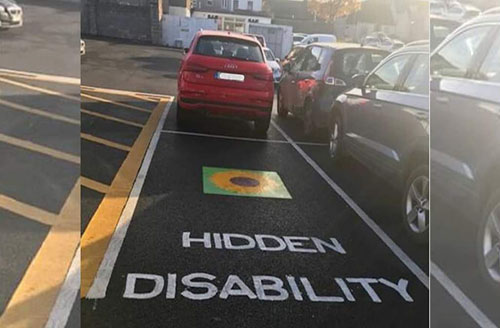Not all disabilities are visible. Then why is there not more hidden disability car parking spaces in Dublin?
When most people think of accessible parking spaces, they typically imagine a designated spot with a wheelchair symbol on the ground. However, hidden disabilities can make finding a suitable parking space challenging, as not all disabilities are visible. For instance, my son is autistic and has a tendency to run off, oblivious to traffic or the danger of moving vehicles. Despite my attempts to secure an autism assistance dog, it is difficult to obtain one in Ireland.
To address this issue, we need to break down the misconception that disabilities are only limited to those who use wheelchairs or have visual or mobility impairments. Hidden disabilities, such as chronic pain, mental health disorders, or neurological conditions, can significantly affect an individual's ability to navigate public spaces. Finding suitable parking spaces can be especially challenging for people with hidden disabilities, whether in public spaces like parks or private car parks in shopping centers.
Fortunately, many countries have introduced "hidden disability" parking permits, allowing people with conditions such as autism, anxiety, and chronic pain to park in designated spaces. These spaces are usually located closer to the entrance of a building or facility and are wider than traditional parking spaces, making it easier for people to enter and exit their vehicles.
Sandymount in Dublin is a wonderful example of an Autism friendly town who have teamed up with businesses and local parks to provide hidden disability car parking spaces (Click to read more)
During the Covid-19 lockdown, I often took my autistic son to a nearby park to burn off energy. One day, I parked in the lower car park designated for over-65s and people with disabilities, despite not being over 65. After playing in the playground, a park warden reprimanded me for parking in the wrong spot. I explained that I had two children with me, including an autistic son and a young toddler, but he only gave me a warning. Since then, the council has decided to keep the lower car park at Ardgillan for over-65s, which can be difficult for families with young children or people with hidden disabilities who need to be closer to the playground.
When this incident with the Park Warden occurred I immediately started advocating for hidden disability car parking spaces with local politicians and autism advocacy groups. I was told to apply for the disability blue badge. What pure ignorance.
The blue badge for disability car parking spaces are provided by the Irish Wheelchair Association for those with restricted movement and not for those with hidden disabilities such as Autism. Several emails to Fingal County Council and the Lord Mayor of Fingal have gone on deaf ears stating they may “review it in the future”.
It's important to note that accessible parking spaces for people with hidden disabilities are not meant to replace or compete with existing accessible parking spaces for people with physical disabilities. Rather, they are meant to complement and expand the existing system, providing more options for people with a wide range of disabilities.
Accessible parking spaces for people with hidden disabilities are an important step towards creating a more inclusive and accessible society. By recognising and addressing the needs of people with hidden disabilities, we can help ensure that everyone has equal access to the services and facilities they need to live their lives to the fullest.

